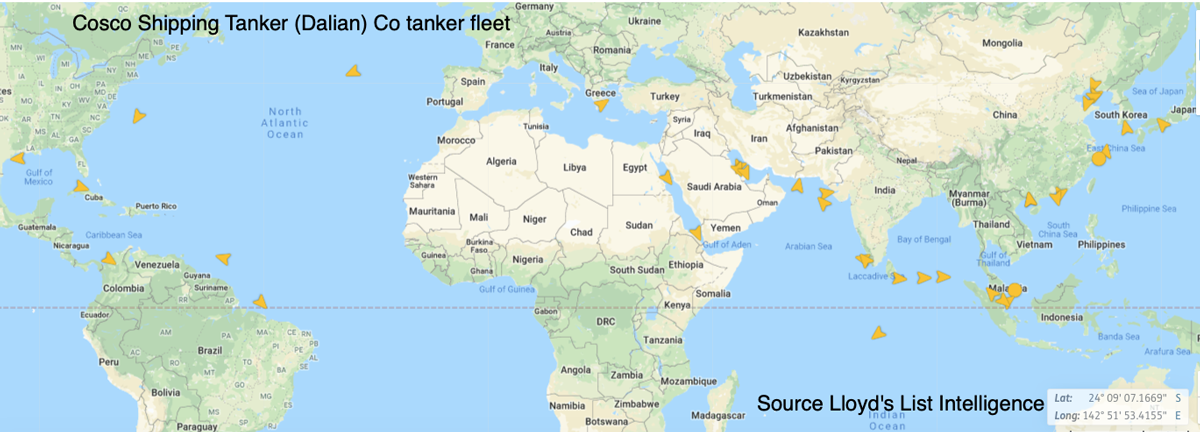Cosco sanctions send ‘shockwave’ through tanker markets as charterers reject Chinese tonnage
Panic sets in as charterers seek urgent legal advice to clarify the status of Cosco links after Washington slapped sanctions on two subsidiaries of Chinese tanker behemoth Cosco, forcing Cosco Shipping Energy Transportation, the oil and gas shipping arm of China Cosco Shipping Corp, to halted trading shares
The Trump administration’s blacklisting of several Chinese companies including two Cosco units has seen tanker rates surge as charterers rushed to protect themselves from potential sanctions risk, switching away from Cosco tonnage
CRUDE tanker rates surged by a third Thursday as oil companies and traders rejected tonnage connected with Chinese state-owned Cosco Shipping Corp — one of the world’s largest shipowners — after the US government sanctioned two of its tanker subsidiaries on Wednesday.
“Yesterday’s decision by the US administration to slap sanctions on six Chinese companies, including two subsidiaries of Chinese tanker behemoth Cosco, has sent shockwaves through tanker markets,” said Alphatanker, the tanker research unit of Paris-based shipbroker BRS, in a note published today.
“Initial indications are that, until it becomes clear which vessels are under sanction, charterers are not accepting any Cosco tonnage.”
The provocative move by the US Treasury to sanction Cosco saw charterers cancel provisionally-booked tonnage connected with any division of the company, as they sought to clarify the legal implications of any exposure to the shipping giant.
Cosco Shipping Tanker (Dalian) Co and Cosco Shipping Tanker (Dalian) Seaman & Ship Management Co were yesterday blacklisted over their role in shipping sanctioned Iranian crude and liquefied petroleum gas to China since May. That includes more than 20 very large crude carriers managed by the subsidiaries and affects nearly 50 vessels directly.
Although the US Office of Foreign Assets Control said sanctions did not apply to the Cosco parent company, charterers of these subsidiaries’ tankers, as well as others linked to the company generally, today sought alternate ships in the spot market.
That pushed up very large crude carrier rates on the biggest seaborne crude route to China from the Middle East Gulf by 34% Thursday, to $46,578 per day. Charterers not only sought replacements on the Middle East Gulf, but also for sailings from West Africa and the US Gulf, another shipbroker reported.
According to a Reuters report on Thursday, China’s Unipec has already made replacement bookings for four oil shipments from the Middle East Gulf in the wake of Washinton’s sanctions. Sources confirmed Unipec, the trading arm of Asia’s top oil refiner Sinopec, had switched to other tanker owners including China Merchants-owned AMCL.
China Shipping Energy Transportation, the oil and gas shipping arm, halted trading of its shares on September 26. The company wholly owns Cosco Shipping Tanker (Dalian) Co. It has 18 liquefied natural gas carriers, 15 of which are currently under construction in deals with partner Teekay and Dynagas.
“This is plainly a very sensitive issue, and one in which very few lawyers will want to go on the record about,” said a maritime attorney who specialised in sanctions, adding that most spent Thursday fending off inquiries from panicking charterers and partners connected to Cosco outside of Asia.
Because most shipping transactions are carried out in US dollars worldwide, marine service providers and charterers were extremely keen to seek clarification, he said. Many were taking an immediate risk-averse approach whilst seeking additional OFAC advice, he added.
Overall Cosco Shipping Corp is the beneficial owner of a fleet of more than 1,000 vessels, including 64 crude tankers and 98 product tankers, with a total fleet exceeding 100m dwt, according to data from Lloyd’s List Intelligence.
“Much of the chaos over the past 24 hours can be attributed to the fact that the ownership and management of Cosco vessels is largely opaque, with a large number of different entities controlled by parent company Cosco,” said the Alphatanker report.
“Thus tanker market participants are unsure of which vessels are sanctioned which has led charterers to shun all vessels connected to Cosco.
“The US administration has only stated which Cosco entities are sanctioned but not what vessels they control, they are unlikely to expand upon this. Therefore, the onus is now on Cosco to state clearly which vessels are controlled by what entity.
“Moreover, until they publish such information it seems unavoidable that charterers will continue to shun all Cosco vessels.”
At least one Cosco Shipping Tanker (Dalian) Co VLCC was seen sailing for Galveston at 1600 hrs London time. The Cosmerry Lake was in mid-Atlantic after leaving the port of Rotterdam on September 17. The vessel had been chartered in mid-September to load a 270,000-tonne crude cargo from the US Gulf by South Korea oil refiner SK Group. Another VLCC is at anchor off Galveston.


